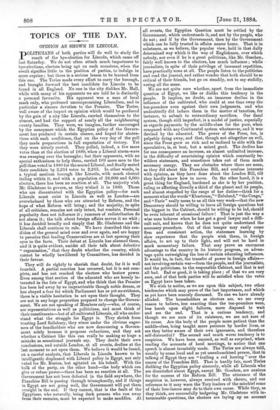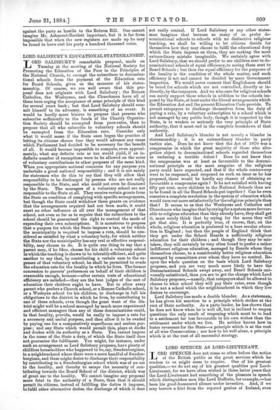TOPICS OF THE DAY.
OPINION AS SHOWN IN LINCOLN.
POLITICIANS of both parties will do well to study the result of the bye-election for Lincoln, which came off last Saturday. We do not often attach much importance to bye-elections, electors being apt on such occasions, when the result signifies little to the position of parties, to indulge in mere caprice ; but there is a serious lesson to be learned from this one. The Tories made every effort to carry the borough, and brought forward the best candidate for Lincoln to be found in all England. No one in the city dislikes Mr. Hall, while with many of his opponents we are told he is distinctly a personal favourite. His opponent was a man of local mark only, who professed uncompromising Liberalism, and in particular a sincere devotion to the Premier. 'The Tories, well aware of the impact on opinion which would be produced by the gain of a city like Lincoln, exerted themselves to the utmost, and had the support of nearly all the neighbouring county families. They were, we imagine, further encouraged by the annoyance which the Egyptian policy of the Govern- ment has produced in certain classes, and hoped for absten- tions with such confidence, that on the very day of the poll they made preparations in full expectation of victory. Yet they were utterly routed. They polled, indeed, a few more votes than at the election'of 1880, when a Liberal storm-wave was sweeping over the boroughs ; but their opponents, with no special enthusiasm to help them, carried 109 more men to the poll than voted in 1880 for the second Liberal, and finally seated their candidate by 3,234 votes to 2,263. In other words, in a typical medium borough like Lincoln, with much clerical feeling within it, and with a population of 38,000 and 6,000 electors, there has been no reaction at all. The majority wish Mr. Gladstone to govern, as they wished it in 1880. Those who are discontented with the Egyptian policy—for such Liberals must exist in Lincoln as well as London—are overwhelmed by those who are attracted by Reform, and the hope of what Reform will bring; and the majority, in spite of all criticism, remains not only intact, but resolute. Personal popularity does not influence it ; rumours of redistribution do not alarm it ; the talk about foreign affairs moves it no whit ; it has decided broadly and simply that Mr. Gladstone and the Liberals shall continue to rale. We have described this con- dition of the general mind over and over again, and are happy to perceive that leading Conservatives are at last opening their eyes to the facts. Their defeat at Lincoln has alarmed them, and it is quite evident, amidst all their talk about defective " organisation," that they doubt whether the country, which cannot be wholly bewildered by Committees, has decided in their favour.
- They will do rightly to cherish that doubt, for it is well founded. A partial reaction has occurred, but it is not com- plete, and has not reached the electors who bestow power. Even among that section of the educated who are keenly in- terested in the fate of Egypt, and who think that the Premier has been led away by an impracticable though noble dream, or has obeyed a fear for which Parliament has as yet no evidence, there is a visible hesitation to act upon their thought. They are not in any large proportion prepared to change the Govern- ment. We are not speaking of Members only—who, of course, are representatives as well as politicians, and .must think of their constituents—but of all cultivated Liberals, all who under- stand what the struggle for Egypt is. They shrink from trusting Lord Salisbury, they wince under the obvious eager- ness of the bondholders who are now denouncing a Govern- ment solely because it proposes reductions, and they ask whether a Cabinet like this can really be making so huge a mistake as sensational journals say. They doubt their own conclusions, and outside London, at all events, decline at the last moment to act upon them. We believe it would be found, on a careful analysis, that Liberals in Lincoln known to be intelligently displeased with Liberal policy in Egypt, not only voted for Mr. Ruston, but agitated on his behalf. With the bulk of the party, on the other hand—the body which can give or refuse power—there has been no reaction at all. The Government has not been defeated in the field anywhere, the Franchise Bill is passing through triumphantly, and if things in Egypt are not going well, the Government will put them straight in the end. If they cannot, that is the fault of the Egyptians, who naturally, being dark persons who run away from their enemies, must be expected to make muddles. At all events, the Egyptian Question must be settled by the- Government, which understands it, and not by the people, who do not ; and if by the Government, then by the Government. which can be fully trusted in affairs nearer home. That is in substance, as we believe, the popular view, held in that chilly determined way which is the way of Englishmen, over which nobody, not even if he is a great politician, like Mr. Goschen, fairly well known to the electors has much influence ; while - journalists, in spite of their privilege of incessant repetition, have practically none at all. The people listen to the politician and read the journal, and rather wonder that both should be so critical of their friends, but go on steadily, not to say stolidly, voting all the same.
We are not quite sure whether, apart from the immediate question of Egypt, we like or dislike this tendency in the people. It implies, no doubt, an immense decline in the influence of the cultivated, who could at one time sway the ten-pounders even against their own judgments, and who undoubtedly did induce them in the matter of taxation, for instance, to submit to extraordinary sacrifices. Our fiscal system, though still imperfect, is a model of justice, especially as regards payments by the middle-class for the poor, when compared with any Continental system whatsoever, and it was devised by the educated. The power of the Press, too, is palpably dying away, and that, though not altogether an evil,, since the Press grew so rich and so inclined to side with the speculative, is, at best, but a mixed good. The decline has for one consequence an increase, an almost unlimited increase, in the difficulty of ascertaining opinion which constantly be- wilders statesmen, and sometimes takes out of them much necessary energy. They see obstacles where there are none, as they did about this Franchise Bill, and confuse interests. with opinion, as they have done about the London Bill, till they hardly know how to move. On the other hand, it is a great thing for England, burdened as she is by her position, ruling or affecting directly a third of the planet and its people, and almost stupefied by the range of her duties—think for a moment what the words "Khartoum," "Zululand," "the Congo," and "Paris" really mean to us all this very week—that the new Democracy should be willing to leave all foreign questions but the biggest to the Cabinet, should be willing to be led, should be even tolerant of occasional failure That is just the way a wise man behaves when he has got a good lawyer and a diffi- cult suit, and knows that he does not quite understand the necessary procedure. Out of that temper may easily come firm and consistent action, the statesmen learning by slow experience that the people wish them, in foreign affairs, to act up to their light, and will not be hard to mark momentary failure. That may prove an enormous advantage to the country in its historic progress, an advan- tage quite outweighing the loss of certain educating influence& It would be, in fact, the transfer of power in foreign affairs— not involving certain war—from the people, and the journalists, and the politicians, to the responsible Cabinet, and that is not all bad. Bad or good, it is taking place ; of that we are very sure, and of that both parties will be satisfied when the votes on Egypt have been taken.
We wish to notice, as we are upon this subject, two other tendencies which may prove of the last importance, and which as yet have been scarcely discussed. To one we have already alluded. The householders as electors are, we see every reason to believe, less exacting than the ten-pounders were, less harsh upon slight failures, more disposed to wait and see the end. That is a curious tendency, and though we are sure of its existence, we are not sure of its cause. Are the body of the people more patient than the middle-class, being taught more patience by harder lives, or are they better aware of their own ignorance, and therefore self-distrustful? The second and much worse tendency is to suspicion. We have been amused, as well as surprised, when reading the accounts of local meetings, to notice that one speech is almost invariably made. The Tories are always told, usually by some local and as yet unenfranchised person, that in talking of Egypt they are " trailing a red herring " over the course of the Franchise Bill. That is hardly fair, most Tories disliking the Egyptian policy sincerely, while all Liberals who are dissatisfied about Egypt, except Mr. Goschen, are anxious for the success of the Reform Bill. The utterance of the suspicion is, however, always received with cheers, and our reference to it may warn the Tory leaders of the mischief some of their free-lances may do to their own cause. While they, as they think, are successfully badgering Mr. Gladstone with in- terminable questions, the electors are laying up an account against the party as hostile to the Reform Bill. One cannot imagine Mr. Ashmead-Bartlett important, but it is far from impossible that when the new registers are made up he may be found to have cost his party a hundred thousand votes.



































 Previous page
Previous page